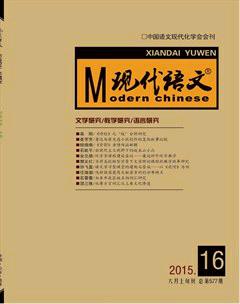汉语“把……视为”英语表达种种
胡潇逸 李延林
在清华大学出版社出版的高等学校教材《新时代交互英语》第三册第一单元Reading One的Ethnic Boundary Markers一文中有这样一句话:“Some native Americans physically appear to be Euro-Americans or African Americans and some African Americans would be identified as Euro-Americans or native Americans on the basis of physical appearance alone.”该小段文字可译成“一些土著美国人看起来很像美籍欧洲人或美籍非洲人,而仅仅靠体貌来判断的话,一些美籍非洲人就会被误当成美籍欧洲人或美国土著人。”
从译文来看,上述原文中的“be identified as”被译成了“被误当成”,“被误当成”是译者根据上下文的翻译;其实,“be identified as”并没有“被误当成”的意义,而是“被视为”之义,严格来讲,该表达只是广义上相当于汉语的“被视为”,是在写作及日常生活中人们经常使用的一个重要结构,它的主动式的基本义是“把……看作是”“认为……是”“把……说成是”“把……想象成”,等等。从结构上讲,英语可以用这样的结构表达:“主词+动词+……+介词+……”或“主词+动词+……+不定式短语+……”,有时甚至还有其他特殊形式。兹作如下分述:
(一)用于褒义表达的“look up to…as…”
(1)我们把他视为学习的光辉榜样。
We look up to him as a shining example for them to learn from.
(2)人们视他为活雷锋。
People look up to him as a living Lei Feng.
(二)褒贬皆可的“look on/upon…as…”
(3)我觉得人家把我们看作是一个由飞黄腾达的伪君子组成的家族。
I thought we were looked on as a race of successful hypocrites.(J. Galsworthy)
(4)我们认为那很奇怪。
We look upon that as very strange.
(三)普通用法的“look at…as”
(5)你慢慢做吧,不要把它看成是负担。
Just take your time.Dont look it as your burden.
(6)老实说,我认为他是个有希望的青年。
To be frank with you,I look at him as a promising youth.
(四)多带贬义色彩的“keep…as…”
(7)他们把黑人视为奴隶(对待)。
They keep the black people as slaves.
(8)他们把公共财产视为自己的私有财产。
They keep the public property as their private property.
(五)褒贬皆可的“think of…as…”
(9)我認为约翰是个可悲的人,一辈子很少有什么成功。
I think of John as a sad person with little success in his life.
(10)全班同学把他视为班上成绩最好的学生。
All his classmates think of him as the best student in the class.
(六)褒贬皆可的“regard…as…”
(11)委员会中的任何一个成员都被认为是能胜任主席这一职位的。
Any member of the committee is regarded as fit to take the chairmanship.
(12)我认为他是个没有原则的人。
I regard him as being without principles.
(七)褒贬皆可的“consider…as/to be…”
(13)我们认为他属于那类不务正业的人。
We considered him as belonging to the group of people who are unmindful of their own work.
(14)他们认为我们能干。
They consider us to be able men.
(八)非正式用法且褒贬皆可的“reckon…as/to be…”
(15)他们把她看作是敌人。
They reckoned her as their enemy.
(16)她被当作是我们班拼写最好的。
She is reckoned to be the best speller in our class.
(九)主动形式表被动意义的“pass for…”
(17)狄克皮肤黝黑,很容易被看成是意大利人或西班牙人。
With his dark skin,Dick could easily pass for an Italian or a Spaniard.
(18)这种繁荣被认为是不可靠的现象。
This kind of prosperity passes for an unreliable phenomenon.
(十)褒贬皆可的“imagine…to be…”
(19)他总是把自己想象成一位优秀演员。
He always imagines himself to be an excellent actor.
(20)她喜欢把自己想象成一名年轻演员。
She likes to imagine herself to be a young actress.
(十一)具有褒义用法的“have…as…”
(21)老师把我们当成自己的好朋友。
The teacher has us as his good friends.
(22)她把她的母亲当成自己的启蒙老师。
She has her mother as her first teacher.
(十二)褒贬皆可的“take…as/to be…”
(23)前几部书可以看成是整部著作的模式。
The first few books can be taken as the pattern of the whole work.
(24)他把该项工作看成是自己的义务。
He took this work as his duty.
(十三)误将甲当成乙的“take…for…”(或“mistake…for…”)
(25)他德语说得很好,常被人误以为是德国人。
She speaks German so well that she is often taken(或“mistaken”) for a native German.
(26)他误将那个穿红衣服的姑娘当成他的女朋友。
He mistook/took the girl in red as his girl friend.
(十四)错把某物当成别的东西的“read…as…”
(27)不能老将沉默误以为是默许。
Silence cannot always be read as agreement.
(28)援助东欧的主张被认为完全正确。
The proposal for aid to eastern Europe is read as absolutely right.
(十五)把某人想象成某种人的“see…as…”
(29)我实在无法想象他是骗子。
I simply cannot see himself as a crook.
(30)当地人把她视为英雄。
The local people see her as a heroine.
(十六)把某人当作某种人对待的“treat…as…”
(31)处理酗酒的人的最好办法是把他/她当成病人对待。
The best way to deal with someone who is drunk is to treat him as sick.
(32)大家都把他视为贵宾。
Everybody treats him as a distinguished guest.
(十七)表示看法的“view…as…”
(33)老师们把学习英语视为轻而易举的事情。
Teachers viewed the study of English as a thing like eating a piece of cake.
(34)他们把导弹看作是一种防卫和威慑力量。
They viewed their missiles as a defensive and deterrent force.
(十八)表示思想認识的“deem…(to be)…”
(35)他们还可设立具有其认为适当的职能的其他委员会.
They may also establish such additional Committees with such functions as it may deem appropriate.
(36)你认为这一计划明智吗?
Do you deem this plan to be sensible/advisable?
(十九)表示普遍认为但有所怀疑的“repute…as…”
(37)他被认为是中国最好的外科医生。
He is reputed as the best surgeon in China.
(38)她被视为一不怕苦二不怕死的人。
She is reputed as the one who is afraid of neither hardship nor death.
(二十)用于褒义的“greet…as…”
(39)当他返回中国时,人们把他当作英雄来欢迎。
Upon her return to China, people greeted him as a hero.
(40)大战结束后,她为何受到英雄般的欢迎?
Why was she greeted as a hero after the war?
研究汉语字词的译法不容易,研究汉语字词的多种译法更不容易,其中藏着许许多多的酸甜苦辣。诚然,翻译工作是个“熬红眼”的工作,做该工作的人得有一种恒心与毅力,要刻苦地学,坚持不懈地练,学贯中西,博古通今,练就一身富有再创作精神的本领,只有这样,才能成为驾驭两种语言、两种文化的专家或大师,成为各学科、各领域的翻译大才。
参考文献:
[1]何炳威.容易误译的英语[M].北京:外语教学与研究出版社,2002.
[2]陈中绳,吴娟.英汉新词新义佳译[M].上海:上海翻译出版公司,1990.
[3]陈忠诚.词语翻译丛谈[M].北京:中国对外翻译出版公司,1983.
[4]单其昌.汉英翻译技巧[M].北京:外语教学与研究出版社,1990.
(胡潇逸,李延林 湖南长沙 中南大学外国语学院 410083)

